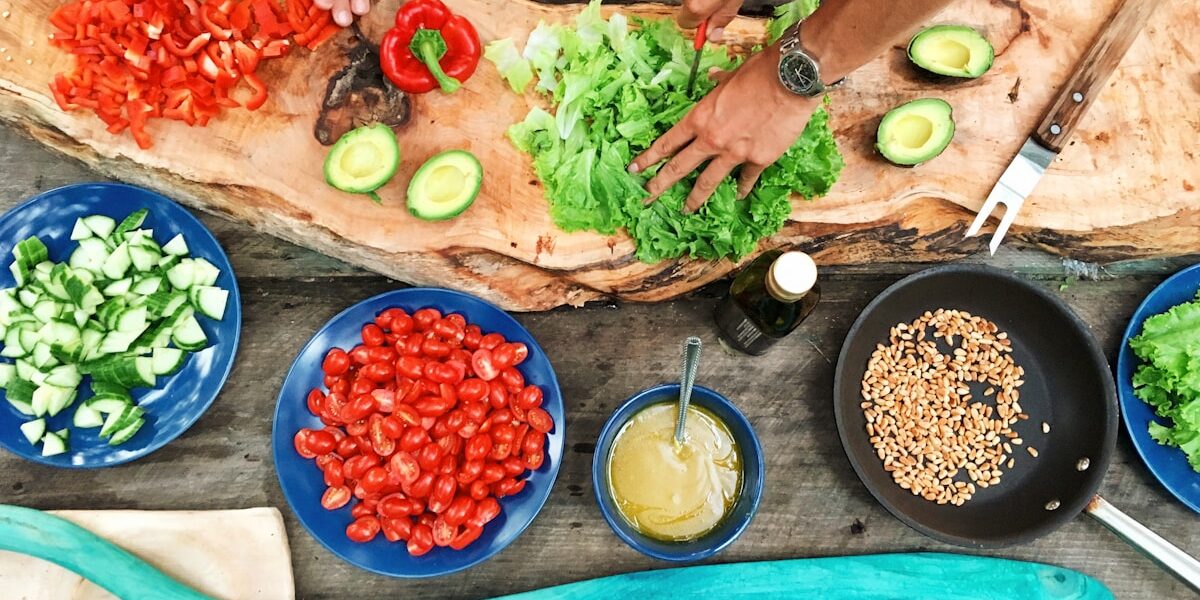Cooking with Fresh Ingredients
Cooking with Fresh Ingredients
The Importance of Fresh Ingredients

Cooking with fresh ingredients can significantly enhance the flavors and nutritional value of your meals. Fresh produce often contains higher amounts of essential vitamins and minerals compared to their processed counterparts.
Using fresh herbs can elevate a dish. For example, fresh basil in a tomato sauce adds a vibrant note that dried basil can’t match. Similarly, fresh vegetables retain their natural texture and taste, making them more enjoyable to eat.
Shopping Tips for Fresh Ingredients
When shopping for fresh ingredients, prioritize local produce. It is often harvested at peak ripeness and hasn’t traveled long distances, which enhances its flavor and nutrient content. Farmers’ markets are excellent sources of fresh, local food. They allow you to speak directly with growers and get tips on how to use and store the items you buy.
Seasonality is also crucial. Fruits and vegetables in season are more likely to be fresh and less expensive. A quick search online can tell you what is in season in your region.
Storing Fresh Ingredients
Proper storage extends the life of fresh ingredients. Leafy greens should be washed, dried, and stored in airtight containers with a paper towel to absorb moisture. Root vegetables like carrots and potatoes keep best in a cool, dark place.
Herbs can be kept fresh by trimming the stems and placing them in a glass of water, much like a bouquet of flowers. Cover loosely with a plastic bag and store in the refrigerator.
Preparing Fresh Ingredients
Thoroughly wash fruits and vegetables to remove any dirt or pesticides. A mixture of water and vinegar can help sanitize produce. Dry them well before use, especially for salads, to ensure dressings stick to the leaves.
Cutting vegetables just before cooking helps retain their nutrients. Fresh herbs should be added towards the end of the cooking process to preserve their flavor. Overcooking fresh greens can lead to nutrient loss, so steaming or lightly sautéing is preferred.
Simple Recipes Using Fresh Ingredients
Fresh Tomato Salad
- 4 ripe tomatoes
- 1 red onion
- 1 cucumber
- Fresh basil leaves
- Olive oil
- Vinegar
- Salt and pepper
Chop the tomatoes, onion, and cucumber into bite-sized pieces. Tear the basil leaves and add to the bowl. Drizzle with olive oil and vinegar, then season with salt and pepper. Toss gently and serve immediately.
Fresh Herb Omelette
- 3 eggs
- Fresh chives, parsley, and dill
- Salt and pepper
- Butter
Beat the eggs in a bowl. Chop the herbs finely and mix with the eggs. Season with salt and pepper. Heat butter in a non-stick pan over medium heat. Pour the egg mixture into the pan. Cook gently, folding the edges until the eggs are set. Serve warm.
Grilled Vegetable Medley
- 1 zucchini
- 1 bell pepper
- 1 red onion
- Olive oil
- Salt and pepper
- Fresh thyme
Slice the zucchini, bell pepper, and onion into thick strips. Toss with olive oil, salt, pepper, and fresh thyme leaves. Grill over medium-high heat until tender and lightly charred. Serve hot off the grill.
Benefits of Fresh Ingredients
Fresh ingredients are generally more nutritious. They retain more vitamins, minerals, and antioxidants. Fresh, seasonal produce supports overall health and well-being. Cooking with fresh ingredients can also reduce the intake of preservatives and added sugars found in processed foods.
There’s also a taste benefit. Fresh ingredients have a natural, vibrant flavor that requires less seasoning and enhances the overall dish. The textures of fresh produce are often superior, providing a more enjoyable eating experience.
Environmental Impact
Using fresh, locally sourced ingredients reduces the carbon footprint associated with food transport. It also supports local farmers and encourages sustainable farming practices. Reducing reliance on packaged and processed foods cuts down on packaging waste.
Growing your own herbs or vegetables can further minimize environmental impact. It provides a fresh source of ingredients right at your doorstep.
Fresh Ingredients in Different Cuisines
Different cuisines place varying degrees of emphasis on fresh ingredients. Mediterranean diets, for instance, are rich in fresh vegetables, fruits, herbs, and olive oil. Traditional Japanese cuisine also focuses on seasonal fish and vegetables, prepared with minimal seasoning to highlight their natural flavors.
Mexican cuisine uses fresh cilantro, tomatoes, and chilies extensively. Indian cooking frequently incorporates fresh spices and herbs like coriander and curry leaves. Exploring these cuisines can provide inspiration for using fresh ingredients in your own cooking.
Recommended Coffee Gear
Baratza Encore Conical Burr Grinder – $169.00
The gold standard entry-level burr grinder.
Hario V60 Ceramic Dripper – $25.00
Pour-over perfection for specialty coffee lovers.
As an Amazon Associate, we earn from qualifying purchases.



